List of Nigerian cities by population
The following are lists of the most populous fully defined incorporated settlements in Nigeria by population. This page consists three different tables, with different kinds of settlements; a list for "defined cities", listing the population, strictly within the defined city limits, a list for "urban area" population, and another list for the population within metropolitan areas.
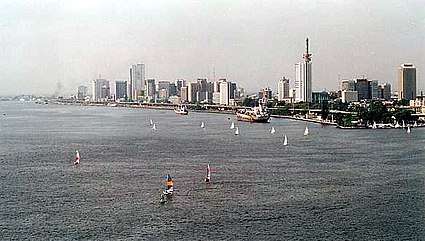
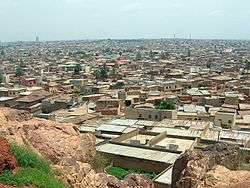
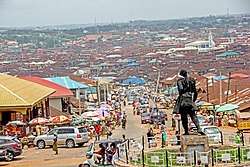
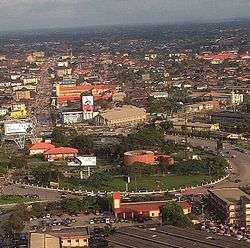
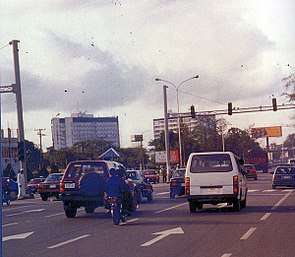
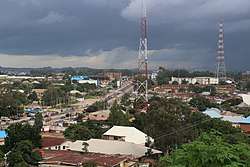
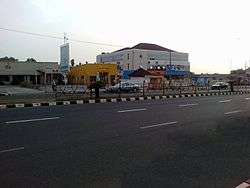
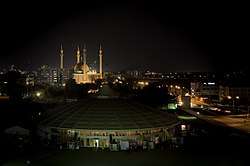
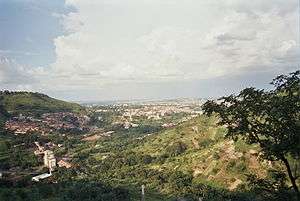
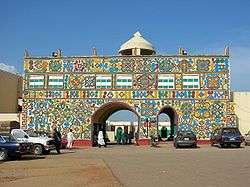
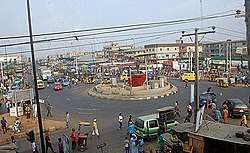
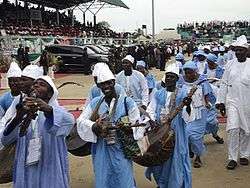
.jpg)
Lists
Defined cities/towns
Nigerian cities are categorized into three types; there is the "Metropolis", which is characterized with having more than one Local Government Areas (LGAs). These type of cities are usually formed when large municipalities are split into smaller LGAs, to aid efficient administration and management, or when small towns grow and merge into existing large cities, or both; some are also formed when urban areas of multiple LGAs merge as a result of growth and are now fully defined as a single settlement, Another type of settlement is the "Municipality", which is basically an LGA that is fully defined as its own city or town. This type of cities are usually mid-sized, although some large cities also exist as a single LGA. The third type of settlement is the "village", which is basically grouped together with several other villages into one sizeable LGA.
The following table lists fully defined incorporated cities in Nigeria, with a population of at least 100,000, as declared by the Nigerian National Population Commission in the 2006 National census.[1] This list refers only to the population of individual cities within their defined limits, which does not include other distinct communities or extended suburban areas within urban agglomerations. A city is displayed in bold if it is a state or federal capital, and in italics if it is the most populous city in the state.
| Rank | City | State | 2006 census | Total area (km²) |
Population density (/km²) |
|---|---|---|---|---|---|
| 1 | Lagos[lower-alpha 1] | Lagos | 8,048,430 | 1,171.3 | 6,871 |
| 2 | Kano[lower-alpha 2] | Kano | 2,828,861 | 449 | 6,300 |
| 3 | Ibadan[lower-alpha 3] | Oyo | 2,559,853 | 3,080 | 831 |
| 4 | Benin City[lower-alpha 4] | Edo | 1,147,188 | 1,204 | 953 |
| 5 | Port Harcourt[lower-alpha 5] | Rivers | 1,005,904 | 369 | 2,726 |
| 6 | Jos[lower-alpha 6] | Plateau | 821,618 | 1,821 | 451 |
| 7 | Ilorin[lower-alpha 7] | Kwara | 777,667 | 765 | 1,016 |
| 8 | Abuja | FCT | 776,298 | 1,769 | 439' |
| 9 | Kaduna[lower-alpha 8] | Kaduna | 760,084 | 131 | 5,802 |
| 10 | Enugu[lower-alpha 9] | Enugu | 722,664 | 556 | 1300 |
| 11 | Zaria[lower-alpha 10] | Kaduna | 695,089 | 563 | 1,234.6 |
| 12 | Warri[lower-alpha 11] | Delta | 557,398 | ||
| 13 | Ikorodu | Lagos | 535,619 | 345 | 1,553 |
| 14 | Maiduguri | Borno | 543,016 | 137 | 3,964 |
| 15 | Aba[lower-alpha 12] | Abia | 534,265 | 72 | 7,400 |
| 16 | Ife | Osun | 509,035 | 1,791 | 284 |
| 17 | Bauchi | Bauchi | 493,810 | 3,687 | 134 |
| 18 | Akure | Ondo | 484,798 | 991 | 489 |
| 19 | Abeokuta | Ogun | 451,607 | 879 | 510 |
| 20 | Oyo[lower-alpha 13] | Oyo | 428,798 | 2427 | 177 |
| 21 | Uyo | Akwa Ibom | 427,873 | 362 | 1,182 |
| 22 | Sokoto | Sokoto | 427,760 | ||
| 23 | Owerri | Imo | 401,873 | 551 | 729 |
| 24 | Yola | Adamawa | 392,854 | 831 | 473 |
| 25 | Calabar | Cross River | 371,022 | 406 | 910 |
| 26 | Umuahia[lower-alpha 14] | Abia | 359,230 | 385 | 933 |
| 27 | Ondo City | Ondo | 358,430 | ||
| 28 | Minna[lower-alpha 15] | Niger | 348,788 | 1,664 | 209 |
| 29 | Lafia | Nasarawa | 330,712 | ||
| 30 | Okene | Kogi | 320,260 | 328 | 976.4 |
| 31 | Katsina | Katsina | 318,459 | 142 | 2,243 |
| - | Ikeja | Lagos | 313,196 | 49.92 | 6,274 |
| 32 | Nsukka | Enugu | 309,633 | 45.38 | |
| 33 | Ado Ekiti | Ekiti | 308,621 | 293 | 1,053 |
| 34 | Awka | Anambra | 301,657 | ||
| 35 | Ogbomosho | Oyo | 299,535 | ||
| 36 | Iseyin | Oyo | 286,700 | ||
| 37 | Mubi[lower-alpha 16] | Adamawa | 280,009 | 1,317 | |
| 38 | Onitsha[lower-alpha 17] | Anambra | 261,604 | 52 | 5,030.8 |
| 39 | Sagamu | Ogun | 253,412 | ||
| 40 | Makurdi | Benue | 249,000 | ||
| 41 | Mokwa | Niger | 244,937 | 4,338 | 56.4 |
| 42 | Badagry | Lagos | 241,093 | 441 | 547 |
| 43 | Ilesa | Osun | 233,900 | ||
| 44 | Gombe | Gombe | 230,900 | ||
| 45 | Obafemi Owode | Ogun | 228,851 | 1,410 | 162 |
| 46 | Owo | Ondo | 218,886 | 1,027 | 213 |
| 47 | Jimeta | Adamawa | 218,400 | ||
| 48 | Suleja | Niger | 216,578 | 119 | 1,820 |
| 49 | Lavun | Niger | 209,917 | 2,835 | 74 |
| 50 | Potiskum | Yobe | 205,876 | 559 | 368 |
| 51 | Kukawa | Borno | 203,864 | 4,901 | 41.6 |
| 52 | Gusau | Zamfara | 201,200 | ||
| 53 | Iwo | Osun | 191,377 | 214 | 894 |
| 54 | Bida | Niger | 188,181 | 51 | 3,689 |
| 55 | Ugep | Cross River | 187,000 | ||
| 56 | Ijebu Ode | Ogun | 186,700 | ||
| 57 | Epe | Lagos | 181,409 | 965 | 188 |
| 58 | Ise Ekiti | Ekiti | 167,100 | ||
| 59 | Gboko | Benue | 166,400 | ||
| 60 | Ilawe Ekiti | Ekiti | 160,700 | ||
| 61 | Ikare | Ondo | 160,600 | ||
| 62 | Osogbo[lower-alpha 18] | Osun | 156,694 | 47 | 3,334 |
| 63 | Okpoko | Anambra | 152,900 | ||
| 64 | Garki | Jigawa | 152,233 | 1,408 | 108.12 |
| 65 | Sapele | Delta | 151,000 | ||
| 66 | Ila | Osun | 150,700 | ||
| 67 | Shaki | Oyo | 150,300 | ||
| 68 | Ijero | Ekiti | 147,300 | ||
| 69 | Ikot Ekpene | Akwa Ibom | 143,077 | 116 | 1,233 |
| 70 | Jalingo | Taraba | 139,845 | ||
| 71 | Otukpo | Benue | 136,800 | ||
| 72 | Okigwe | Imo | 132,237 | ||
| 73 | Kisi | Oyo | 130,800 | ||
| 74 | Buguma | Rivers | 124,200 | ||
| 75 | Funtua | Katsina | 122,500 | ||
| 76 | Abakaliki | Ebonyi | 151,723 | ||
| 77 | Asaba[lower-alpha 19] | Delta | 149,603 | 268 | 558 |
| 78 | Gbongan | Osun | 117,300 | ||
| 79 | Igboho | Oyo | 115,000 | ||
| 80 | Gashua | Yobe | 109,600 | ||
| 81 | Bama | Borno | 102,800 | ||
| 82 | Uromi | Edo | 101,400 | ||
Urban areas
An urban area is a continuously built up land mass of urban development that is within a labor market, without regard for administrative or city boundaries. An urban area is a human settlement with high population density and infrastructure of built environment.
This is section lists contiguous urban areas in Nigeria, with a population of at least 500,000. The figures here have been taken from Demographia's "World Urban Areas" study 2016. Demographia uses maps, satellite photographs to estimate continuous urbanization.[2]
| Rank | City | State | Population | Area (km2) | Density (/km2) |
|---|---|---|---|---|---|
| 1 | Lagos | Lagos | 12,830,000 | 1,425 | 9000 |
| 2 | Onitsha | Anambra | 7,425,000 | 1,965 | 3,800 |
| 3 | Kano | Kano | 3,680,000 | 251 | 14,600 |
| 4 | Ibadan | Oyo | 2,910,000 | 466 | 6,200 |
| 5 | Uyo | Akwa Ibom | 1,990,000 | 729 | 2,700 |
| 6 | Port Harcourt | Rivers | 1,865,000 | 158 | 11,800 |
| 7 | Nsukka | Enugu | 1,735,000 | 645 | 2,700 |
| 8 | Abuja | FCT | 1,580,000 | 225 | 7,000 |
| 9 | Benin City | Edo | 1,355,000 | 228 | 5,900 |
| 10 | Aba | Abia | 1,215,000 | 91 | 13,400 |
| 11 | Kaduna | Kaduna | 1,100,000 | 153 | 7,200 |
| 12 | Ilorin | Kwara | 890,000 | 83 | 10,700 |
| 13 | Jos | Plateau | 790,000 | 70 | 11,300 |
| 14 | Maiduguri | Borno | 765,000 | 155 | 4,900 |
| 15 | Owerri | Imo | 750,000 | 130 | 5,800 |
| 16 | Ikorodu | Lagos | 740,000 | 130 | 5,700 |
| 17 | Zaria | Kaduna | 735,000 | 88 | 8,300 |
| 18 | Enugu | Enugu | 715,000 | 78 | 9,200 |
| 19 | Warri | Delta | 695,000 | 142 | 4,900 |
| 20 | Osogbo | Osun | 680,000 | 104 | 6,600 |
| 21 | Akure | Ondo | 585,000 | 117 | 5,000 |
| 22 | Sokoto | Sokoto | 580,000 | 88 | 6,600 |
| 23 | Abeokuta | Ogun | 520,000 | 62 | 8,400 |
| 24 | Bauchi | Bauchi | 520,000 | 88 | 5,900 |
Metropolitan areas
See also
- List of cities in Nigeria
- List of populated places in Nigeria
- Lists of villages in Nigeria
Notes
- Metropolitan Lagos consists 16 out of Lagos State's 20 LGA, which excludes: Badagry, Epe, Ibeju-Lekki and Ikorodu
- summing the 8 LGAs in Kano, which includes: Kano Municipal, Fagge, Dala, Gwale, Tarauni, Nasarawa, Ungogo and Kumbotso
- Summing the 11 LGAs of Ibadan
- Benin City consists of 3 LGAs, which includes: Egor, Oredo and Ikpoba-Okha
- summing Obio-Akpor and Port Harcourt LGA, which both makeup the city
- Jos consists of 3 LGAs, which includes: Jos North, Jos South and Jos East
- Ilorin consists of 3 LGAs, which includes: Ilorin East, Ilorin South and Ilorin West
- Kaduna consists of 2 LGAs, which includes: Kaduna North and Kaduna South
- Enugu East, Enugu North and Enugu South LGAs
- Zaria consists of 2 LGAs, which includes: Zaria and Sabon Gari
- Warri North, Warri South and Warri South West LGAs
- Aba North and Aba South LGAs
- Atiba, Oyo East and Oyo West LGAs
- Umuahia North and Umuahia South LGAs
- Bosso and Chanchaga LGAs
- summing Mubi North and Mubi South
- consists 2 LGAs: Onitsha North and Onitsha South
- Osogbo and Olorunda LGAs
- Oshimili South LGA
References
- "FEDERAL REPUBLIC OF NIGERIA : 2006 Population Census" (PDF). Web.archive.org. Archived from the original (PDF) on 5 March 2012. Retrieved 25 July 2016.
- Demographia (April 2016). Demographia World Urban Areas (PDF) (12th ed.). Retrieved November 17, 2016.
Further reading
- Herbert O. Emezi (1975), Nigerian Population and Urbanization, 1911-1974: A Bibliography, University of California, Los Angeles, Coleman African Studies Center – via California Digital Library
External links

